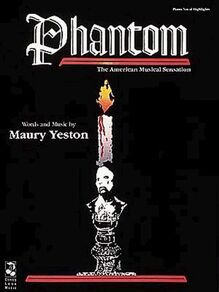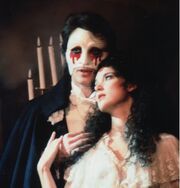
Phantom: The American Musical Sensation
Yeston and Kopit had just finished the musical Nine, winner of the Tony Award for Best Musical in 1982, when they were approached by actor/director Geoffrey Holder to write a musical based on Leroux's novel. Holder had obtained the rights to musicalize the novel in America from the Leroux estate, making Phantom the only Phantom of the Opera musical to do so. Holder planned to direct. Initially, Yeston was skeptical of the project. "I laughed and laughed.... That's the worst idea in the world! Why would you want to write a musical based on a horror story?.... And then it occurred to me that the story could be somewhat changed.... [The Phantom] would be a Quasimodo character, an Elephant Man. Don't all of us feel, despite outward imperfections, that deep inside we're good? And that is a character you cry for."
In 1984, British producer Ken Hill produced a melodrama musical of The Phantom of the Opera in England. This was not a big threat to Holder, Kopit and Yeston, since their musical was intended to play on Broadway. The real threat emerged through an announcement in Variety, where an article was published concerning plans for a musical production of The Phantom of the Opera by Andrew Lloyd Webber. The rights to the novel were in the public domain in Great Britain. Holder only held the rights for two years in the United States and Europe before the property became public domain there as well. Yeston had completed much of the score to Phantom, and Yeston, Kopit and Holder were in the process of raising money for a Broadway production when the Lloyd Webber plans were announced.
After The Phantom of the Opera became a smash hit in London in 1986, Lloyd Webber announced a Broadway production, and Yeston's Broadway investors backed out. Yeston, Kopit and Holder reluctantly shelved their plans for Phantom and went their separate ways for a time. When Kopit saw the Lloyd Webber version of The Phantom of the Opera in New York, he realized that the approach he and Yeston had taken was fundamentally different and that it could still work on the musical stage. A few years later, he rewrote his script outline into a teleplay for a 4-hour 2-part miniseries and sold it to NBC, with Yeston's blessing. It was filmed at the Opera Garnier, and the only music used was opera music. It starred Charles Dance, Teri Polo and Burt Lancaster and premiered on television in 1990. Kopit said, "I told Maury to hold on. There were Phantom musicals sprouting up all over the place by that time. Maybe someone would see the miniseries, think it would make a good musical and we'd be ready."
The Yeston/Kopit musical was finally produced by Theater Under the Stars in 1991, and Phantom has since received over 1,000 productions around the world. Yeston refers to the musical as "the greatest hit never to be produced on Broadway." Yeston's Phantom is more operetta-like in style than Lloyd Webber's, seeking to reflect the 1890s period, and seeks to project a French atmosphere to reflect its Parisian setting.
Plot[]
Act 1[]
The story begins with a young street singer Christine at the time of the first meeting of Erik (the Phantom). Erik was born and raised in the catacombs under the Paris Opera House and needs beautiful music – he cannot exist without it. He accepts Christine as his pupil, training her for the opera, but forbids her to see his face. Complications arise when Gérard Carrière, the company manager, loses his position as head of the Opera house and therefore cannot protect Erik any longer. Furthermore, Carlotta, the new diva and owner of the Opera, has such a terrible voice that the Phantom is in torment. His salvation must eventually come through Christine, whose voice is so beautiful that he falls in love with her.

Richard White & Glory Crampton
Act 2[]
Later, it is revealed that Carrière is actually Erik's father. Erik fears that he will be captured and treated like a circus freak because of his horrendous face (which is never seen). The police surround him and the chief of police tells his men not to shoot because they "can take him alive!" Erik shouts out to his father for help. Carrière understands; he grabs a policeman's gun and aims at his son. After a struggle with himself, he fires, and the Phantom falls, calling out Christine's name.
Principal roles and cast[]
- Erik, the Phantom - Richard White
- Christine Daaé - Glory Crampton
- Count Philippe de Chandon - Paul Schoeffler
- Gérard Carrière - Jack Dabdoub
- Alain Choleti - Lyle Garrett
- Carlotta - Patty Allison (replaced by Meg Bussert on the recording)
- Joseph Buquet - Allen Kendall
- Inspector Ledoux - James Van Treuren
Other notable cast members in later productions:
- Erik, the Phantom - Robert Cuccioli
- Christine Daaé - Kristin Chenoweth
Musical Numbers[]
Act 1[]
- Overture
- Melodie de Paris - Christine, Philippe, Street Vendors and Prisienne
- Paris Is a Tomb - Erik
- Dressing For The Night - Open Company and First Nighters
- Where In The World - Erik
- This Place Is Mine - Carlotta
- Home - Christine and Erik
- The Music Lessons/Phantom Fugue - Erik, Christine, Carlotta, Cholet, Ledoux, Policemen and Opera Company
- You Are Music - Christine and Erik
- The Bistro - Carlotta, Christine, Waiters and Bistro Partygoers
- Who Could Ever Have Dreamed Up You? - Philippe and Christine
- Dressing For The Night (Reprise) - Open Company
- This Place Is Mine (Reprise) - Carlotta
- Tatiana's Entrance - Oberon, Christine, and Opera Company
- Where In The World (Reprise) - Erik
Act 2[]
- Entr'acte
- Without Your Music - Erik
- Where In The World (Reprise 2) - Erik
- The Story of Erik - Carriere, Belladova, Young Carriere, Young Erik, and Company
- My True Love - Christine
- My Mother Bore Me - Erik
- You Are My Own - Erik and Carriere
- Finale: You Are Music (Reprise) - Christine
Productions[]
Original production In January 1991, Houston Texas’s Theater Under the Stars presented the world premiere of the Yeston/Kopit musical, renamed simply Phantom to separate it further from Lloyd Weber's and other productions of Phantom of the Opera. Richard White starred in the title role. Members of the Houston cast recorded a cast album released by RCA records.
Early regional U.S. productions That summer, Yeston and Kopit made a few cuts and changes to the musical. In the fall, the revised version was presented in Seattle and at the California Theatre of Performing Arts in San Bernardino in California and was received warmly. In Chicago, Bill Pullinsi, Artistic Director of the Candlelight Playhouse staged the production, receiving rave reviews in publications including Variety and the Wall Street Journal. This led to other editions in other cities, including 1992 productions at Casa Mañana in Ft. Worth, Texas, Seaside Music Theater in Daytona Beach, and at the Westchester Broadway Theatre in New York State, starring Robert Cuccioli in the title role, and 1993 productions at Music Theater of Wichita (Kansas) and Musical Theatre Southwest in Albuquerque, New Mexico.
International productions An Estonian-language version of Phantom was performed from November 15 to December 1, 2007 at the Linnahall in Tallinn. The phantom was Estonian rap star Chalice, and Christine was Estonian singer Hanna-Liina Võsa. Estonian crooner Tõnis Mägi played Gerard Carriere, and Estonian pop star Mikk Saar played Count de Chagny. This Phantom was directed by Liis Kolle and produced by Mikk Purre.
Phantom has been performed in Japanese translation by the Cosmos Troupe of Takarazuka Revue in 2004 (featuring Yoka Wao and Mari Hanafusa) and in 2006 by Flower Troupe (featuring Sumire Haruno and Ayane Sakurano in her Grand Theater debut).
A German-language version ran for three years in Germany.
2007-2008 Westchester revivals In October through November 2007, the show played at the Westchester Broadway Theater, in Elmsford, New York, and is playing again from December 27, 2007 to February 9, 2008 featuring Robert Cuccioli reprising the title role.
Reception[]
The Los Angeles Times review opined, "There is a lot more understanding of Erik than of Lloyd Webber's more furtive phantom, but also less mystique. Kopit puts in details Leroux never imagined. The humanity makes for a different kind of show that hasn't found a stylistic identity. The operetta thrust makes it an old-fashioned crowd-pleaser, but traps Yeston's music between the old and the new." Peter Scott-Pressland found the London production "hum-drum", but wrote: "[A]s a piece of writing, Yeston's Phantom is altogether more engaging than ALW's. It is tighter, more intimate and informed by more human sympathy. ... While it doesn’t produce the kind of melodic sweep and glamour of ALW, it rises ... in the second act to genuine emotional fervour. ... Erik is altogether more engaging and believable than the Lloyd-Webber skulker." He stated that this makes the Beauty and the Beast theme "credible and agonizing", and that the father-son theme is even more "moving in the agony of both loving and loathing the thing you have spawned."